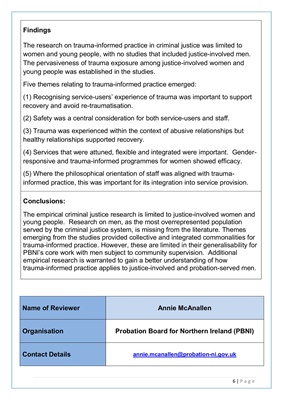
6 | P a g e
Findings
The research on trauma-informed practice in criminal justice was limited to
women and young people, with no studies that included justice-involved men.
The pervasiveness of trauma exposure among justice-involved women and
young people was established in the studies.
Five themes relating to trauma-informed practice emerged:
(1) Recognising service-users' experience of trauma was important to support
recovery and avoid re-traumatisation.
(2) Safety was a central consideration for both service-users and staff.
(3) Trauma was experienced within the context of abusive relationships but
healthy relationships supported recovery.
(4) Services that were attuned, flexible and integrated were important. Genderresponsive
and trauma-informed programmes for women showed efficacy.
(5) Where the philosophical orientation of staff was aligned with traumainformed
practice, this was important for its integration into service provision.
Conclusions:
The empirical criminal justice research is limited to justice-involved women and
young people. Research on men, as the most overrepresented population
served by the criminal justice system, is missing from the literature. Themes
emerging from the studies provided collective and integrated commonalities for
trauma-informed practice. However, these are limited in their generalisability for
PBNI's core work with men subject to community supervision. Additional
empirical research is warranted to gain a better understanding of how
trauma-informed practice applies to justice-involved and probation-served men.
Name of Reviewer
Annie McAnallen
Organisation
Probation Board for Northern Ireland (PBNI)
Contact Details
annie.mcanallen@probation-ni.gov.uk